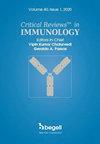基于自然杀伤细胞的肝细胞癌免疫疗法的现状与未来
IF 0.9
4区 医学
Q4 IMMUNOLOGY
引用次数: 0
摘要
自然杀伤(NK)细胞是一种先天性淋巴细胞,对 NK 特异性靶点具有高水平的细胞毒性,能产生各种细胞因子,并能与 T 细胞、B 细胞和树突状细胞相互作用,有效地充当先天性免疫系统的前线。此外,NK 细胞是肝脏中第二常见的免疫细胞。肝癌占所有肝癌的 75%,是全球癌症相关死亡的第四大原因。NK 细胞对 HCC 的显著抗癌功能包括激活抗体依赖性细胞毒性(ADCC)、促进 Gasdermin E 介导的 HCC 细胞热解,以及通过 cGAS-STING 信号通路启动抗肿瘤反应。在本综述中,我们将介绍这些机制如何在 HCC 中发挥作用。然后,我们将讨论现有的临床前和临床研究,这些研究利用 NK 细胞的活性创造了单一和联合免疫疗法。本文章由计算机程序翻译,如有差异,请以英文原文为准。
The Current and Future States of Natural Killer Cell-Based Immunotherapy in Hepatocellular Carcinoma
Natural killer (NK) cells are innate lymphoid cells that exhibit high levels of cytotoxicity against NK-specific targets, produce various cytokines, and interact with T cells, B cells, and dendritic cells to effectively serve as frontliners of the innate immune system. Moreover, NK cells constitue the second most frequent immune cell in the liver. These properties have drawn significant attention towards leveraging NK cells in treating liver cancer, especially hepatocellular carcinoma (HCC), which accounts for 75% of all liver cancer and is the fourth leading cause of cancer-related death worldwide. Notable anti-cancer functions of NK cells against HCC include activating antibody-dependent cell cytotoxicity (ADCC), facilitating Gasdermin E-mediated pyroptosis of HCC cells, and initiating an antitumor response via the cGAS-STING signaling pathway. In this review, we describe how these mechanisms work in the context of HCC. We will then discuss the existing preclinical and clinical studies that leverage NK cell activity to create single and combined immunotherapies.
求助全文
通过发布文献求助,成功后即可免费获取论文全文。
去求助
来源期刊
CiteScore
2.60
自引率
0.00%
发文量
14
审稿时长
>12 weeks
期刊介绍:
Immunology covers a broad spectrum of investigations at the genes, molecular, cellular, organ and system levels to reveal defense mechanisms against pathogens as well as protection against tumors and autoimmune diseases. The great advances in immunology in recent years make this field one of the most dynamic and rapidly growing in medical sciences. Critical ReviewsTM in Immunology (CRI) seeks to present a balanced overview of contemporary adaptive and innate immune responses related to autoimmunity, tumor, microbe, transplantation, neuroimmunology, immune regulation and immunotherapy from basic to translational aspects in health and disease. The articles that appear in CRI are mostly obtained by invitations to active investigators. But the journal will also consider proposals from the scientific community. Interested investigators should send their inquiries to the editor before submitting a manuscript.

 求助内容:
求助内容: 应助结果提醒方式:
应助结果提醒方式:


